| Composer's Voice Concert | ![[ Vox Novus - the new voice for contemporary music ]](http://www.voxnovus.com/img/Vox_Novus_Logo_black.png) |
| Sonnets | |
| November 23, 2003 | |
| Christ & St. Stephen's Church 120 West 69th Street New York, New York 10023 |
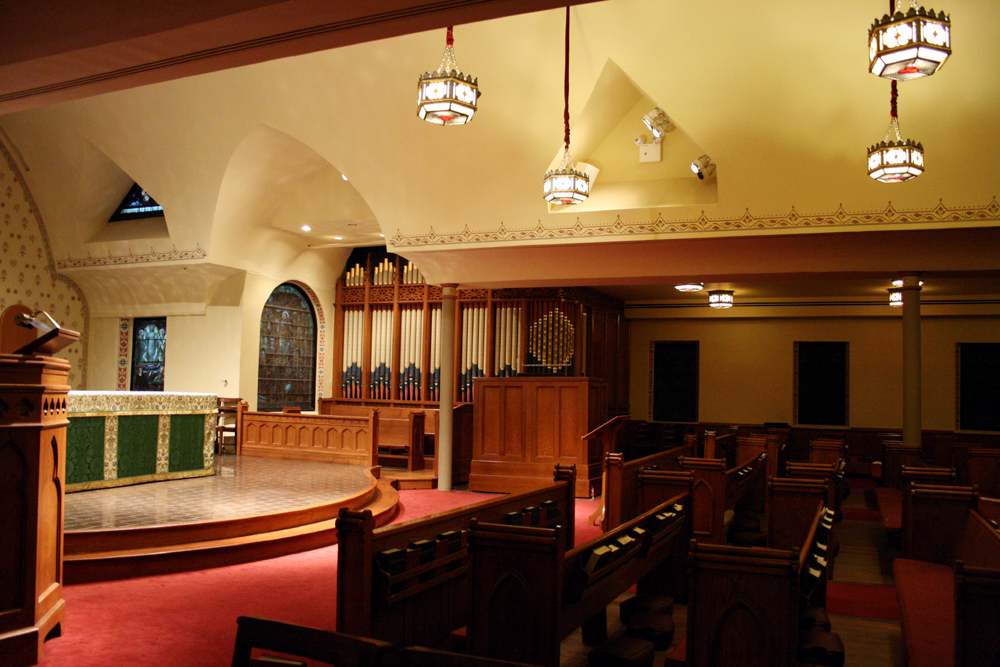 |
Vox Novus and Living Music Foundation in conjunction with the Society of Chromatic Art would like to present a Composer's Voice concert featuring James Romig. Performances by Louis Hanzlik on trumpet, clarinetist Enid Blount, and pianist Ashlee Mack flutist John McMurtery,pianist Theresa Rosas |
| Title | Composers | Performers |
| Islands That Never Were, | James Romig | Ashlee Mack - piano solo |
| Oiseau Miro, | James Romig | John McMurtery - flute solo |
| Thread Sketches, | James Romig | Ashlee Mack - piano solo |
| Sonnet 2, | James Romig | John McMurtery - flute solo |
| Sonnet 3, | James Romig | Enid Blount - clarinet solo |
| Glimpses, | Marco Oppedisano | Enid Blount - clarinet solo |
| So(Not)a for Trumpet, | Benjamin Bierman | Louis Hanzlik - trumpet and Ashlee Mack - piano |
| Soliloquy, | Ed Taylor | John McMurtery - flute solo |
| run rabbit run, | Robert Voisey | John McMurtery - flute and Ashlee Mack - piano |
| Performers | |
| Enid Blount, clarinetist, has a diverse repertoire embracing many styles, including those of composers ranging from Mozart and Brahms to Berio and beyond. Blount holds a Master’s Degree in Clarinet Performance from the University of Southern California, a Bachelor’s Degree from Oberlin Conservatory, and also studied at the North Carolina School of the Arts. She has performed in Weill Recital Hall at Carnegie Hall with the Alaria Chamber Ensemble and at Carnegie Hall with the New England Symphonic Ensemble. Other performances have included several concerti with orchestras, many new music performances, extensive chamber music performances and tours in Germany and Italy. She is a guest coach of chamber music with the Alaria Chamber Ensemble at the Mannes College of Music and is on the faculty of the Hartwick College Summer Music Festival in Oneonta, New York. | |
| Louis Hanzlik is a trumpeter based in New York City where he is active as an orchestral player, chamber musician, and educator. Hanzlik has been a member of the Atlantic Brass Quintet since 2002, and serves as co-principal trumpet with the Riverside Symphony, and the Iris Chamber Orchestra. He also performs frequently with many New York based ensembles including the Orchestra of St. Luke’s, Orpheus Chamber Orchestra, and the Westchester Philharmonic. Hanzlik promotes the commissioning and performance of ‘new music’ for brass and, with the Atlantic Brass Quintet, regularly seeks out composers for collaboration. He is also an advocate of period instrument practice, most notably baroque trumpet, having performed with groups such as the Orchestra of the 17th Century, Artek, and Pro Arte. He has prepared, performed, and recorded many of his own editions and arrangements of Renaissance and Baroque music for modern brass. He can be heard on the Naxos, Summit, Decca, Chandos, Arabesque, Bridge, and New World labels and has recorded frequently for television. Louis Hanzlik is a graduate of the University of Iowa and the Juilliard School. | |
 |
Ashlee Mack, specializing in contemporary music, has recently performed new compositions by Jackson Hill, Guy Klucevsek, Jeffrey Leeman, and James Romig, and classic contemporary works by Aaron Copland, Henry Cowell, and George Crumb. She first performed with the Society for Chromatic Art in 2002, and recently presented research at the College Music Society National Conference in Kansas City. In addition to master classes with Kevin Sharpe, Barry Snyder, and Paavali Jumppanen, Ms. Mack earned her undergraduate degree in piano performance at Bucknell University, where she studied with Lois Svard and was awarded the Barbara Watson Grever Prize in Music. |
| Flutist John McMurtery performs as a soloist, chamber musician, and orchestra member throughout the United States and Europe. He appeared as soloist with The New Vienna Chamber Ensemble in 2000 as part of the Wien Modern concert series. In 1997 he toured Europe with the vocal ensemble Les Chanteuses, giving recitals in France, Germany, Austria, and the Czech Republic. Mr. McMurtery is currently a member of UpTown Flutes, which was recently awarded a Carnegie Hall debut recital by Artists International. As the assistant director of the Society for Chromatic Art, McMurtery is dedicated to commissioning and performing works by contemporary composers. McMurtery is the winner of the Central Washington University Orchestra Concerto Competition in 1996, and is the recipient of several first-place awards at the Greater Spokane Music and Allied Arts Festival. He also performed with Sonora Winds, an ensemble sponsored by Rutgers University for community outreach concerts in New Jersey and Pennsylvania. McMurtery holds the principal flute chair of the Manhattan Chamber Orchestra and the Dicapo Opera Company, and performs with Symphony 21 and the Rutgers Summerfest Orchestra. Mr. McMurtery is currently a Doctoral Fellow at the Juilliard School, under the guidance of Julius Baker. | |
| Theresa Rosas is a pianist and teacher living in Brooklyn, NY. She recently received a Master’s Degree in piano performance from the City University of New York and a Bachelor’s Degree from Brooklyn College and currently studies with German Diez. | |
| Composers | |
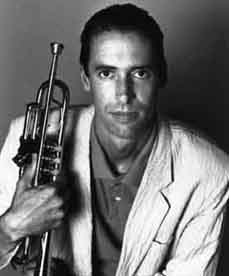 |
Benjamin Bierman is a composer, trumpet player, pianist, arranger, producer, and society trumpeter and band leader. Bierman is currently finishing his Masters Degree in composition at the Conservatory of Music at Brooklyn College, where he is the Graduate Fellow at the Center for Computer Music, and he is beginning his Doctoral work in composition in the Spring of 2002 at the City University of New York Graduate Center. He has studied composition with Tania Leon, John Corigliano, and David Del Tredici. Bierman was the recipient of the Institute for Studies in American Music Award in Composition for 2000, as well as the Rosa Riegelman award for Music Scholarship. |
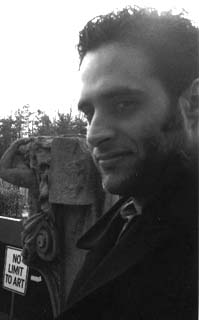 |
Marco Oppedisano was born in Brooklyn, NY. He began playing guitar at the age of 12 and entered undergraduate studies as a classical guitar performance major, studying with Michael Cedric Smith. He holds a B.A in Music Composition from the Brooklyn College Conservatory of Music, an M.A in Music Composition from the Queens College Aaron Copland School of Music and has studied composition with Noah Creshevsky, Charles Dodge, Tania Leon, Thea Musgrave and Henry Weinberg. |
| James Romig has been performing and composing music since age five. His compositions have been performed throughout the United States and Europe in recitals, music festivals, and as accompaniment to dance. In the tradition of his musical mentors, Charles Wuorinen and Milton Babbitt, Romig's music celebrates dramatic balance, exuberant virtuosity, and rigorous formal integrity. Among his commissioned works are compositions for the Manhattan Chamber Orchestra, the Interlochen Arts Academy, the Percussive Arts Society, and new-music ensembles such as Suono Mobile, Helix!, and the New Vienna Chamber Ensemble. In recent seasons, his music has been included on concerts by the University of Iowa Symphony Orchestra (James Dixon, conductor), the Ensemble Musicattuale (Bologna, Italy), the Eastman Contemporary Percussion Ensemble (Rochester, New York), Duo Contour (Freiburg, Germany), and Holy Trinity Choirs (New York City). Recent festival performances include the 50th Annual Fulbright Music Gala (Berlin, Germany), the UTSA Festival of New Music (San Antonio, Texas), and Wien Modern (Vienna, Austria.) Romig’s works are available from Parallax Music Press, Penn Oak Press (Philadelphia), and the American Music Center (New York City). Romig holds a Ph.D. in music theory and composition from Rutgers University, and Bachelor’s and Master’s degrees in music from the University of Iowa. A dedicated educator, he gives frequent lectures and masterclasses, including recent talks at Westminster Choir College Conservatory, the Interlochen Arts Academy, and The Juilliard School. Romig has taught at Rutgers University, Bucknell University, the University of Iowa, Pittsburg State University, and is currently on the faculty at Western Illinois University. He also serves as music director and principal conductor of The Society for Chromatic Art, a contemporary-music ensemble based in New York City. | |
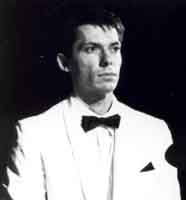 |
Edward Taylor, born and raised just outside of New York City, received a Bachelor of Music Degree in jazz studies from the Mason Gross School of the Arts and a Master’s Degree in music theory and composition from Rutgers University. Currently a doctoral candidate at Rutgers, Taylor studies composition with Charles Wuorinen. Taylor's works have been performed by Fred Sherry, the New York New Music Ensemble and Harvey Sollberger, the N.Y.U. New Music Ensemble, Helix!, and the Society for Chromatic Art. Additionally, he has been a featured composer on the Zoom: Composers Close Up concert series. He currently serves as artistic director of the Society for Chromatic Art, a New York-based new music ensemble. |
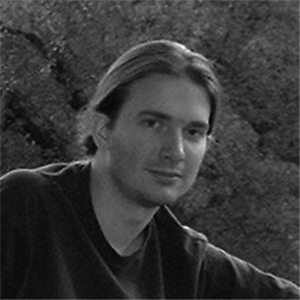 |
"Robert Voisey composes music as a natural part of his life…” - Noah Creshevsky Robert Voisey has studied composition at the State University of New York at Stony Brook, the College of Tel Hai in the Upper Galilee, Israel and the City University of New York at Brooklyn College. His teachers have included Noah Creshevsky, George Brunner, Aiten Schteinberg, and Oded Zehavi. Voisey is the Artistic Director of the “Composer Voice” concert series at Vox Novus and the “60x60” project, an annual project featuring works from 60 composers and their 60 second compositions. In conjunction with being the Vice-President of the Living Music Foundation and founder of Vox Novus, Voisey continues his mission to promote contemporary music. |
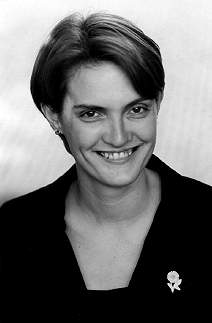 |
Orianna Webb's music has been described as "abound[ing] in urgent and mysterious detail" (Cleveland Plain Dealer). Her newest orchestral work, Xylem, was the winner of the 2003 Leo Kaplan Award, the highest honor in the ASCAP Foundation Morton Gould Young Composer Awards. Ms. Webb was recently awarded a First Music Commission from the New York Youth Symphony for a piano trio to be premiered at Carnegie Hall. Other performances slated for the current season include Xylem under the baton of Emily Freeman Brown at the Bowling Green State University New Music and Art Festival, a new chamber work with guitar commissioned by Guitars International for premiere by Daniel Lippel in Cleveland, and the premiere at the University of Iowa in Iowa City of a new work commissioned by SCI and ASCAP. Ms. Webb's music has enjoyed performances at the Norfolk Contemporary Music Workshop (CT), the Minnesota Orchestra's Composer Readings and Institute, the Newburyport Chamber Music Festival (MA), the 2003 International Trombone Festival (Helsinki, Finland), the Rock Hotel Pianofest Piano Bowl (Society Hall, NY), New Music New Haven, and the Cleveland Museum of Art's AKI Festival of New Music. Her music has been performed by the Yale Philharmonia, the Cleveland Orchestra Youth Orchestra, the Mostly Modern Chamber Music Society, the University of Akron New Music Group/Daedalus, the Music2000 Festival (Cincinnati), AugustArt (Raw Space Studios, NY), and the Ohio & Erie Canal Opera Project. Ms. Webb's music has been recognized with prizes from the International Alliance for Women in Music, the International Trombone Association, the National Federation of Music Clubs, and the Darius Milhaud Society. A native of Akron, OH, Ms. Webb holds degrees from the Yale School of Music, the Cleveland Institute of Music (CIM), and the University of Chicago. Her teachers have included Martin Bresnick, Margaret Brouwer, John Eaton, Joseph Schwantner, and Roger Zahab, and she has also studied at La Schola Cantorum in Paris with Samuel Adler and Philip Lasser. She studied piano with Nicolas Constantinidis, Ethel Burke, and Anna Grinberg, and bassoon with Dr. Georgia Peeples. Ms. Webb is also a founding faculty member of the Young Composers Program at CIM. |
Program Notes: |
|
Oiseau Miró, commissioned by a consortium of New York-area flutists in 2000, was premiered by John McMurtery at Christ and St. Stephen's Church in New York City in March, 2001. Sophia Anastasia has recorded the work and included it on her “Musing” cd release. The basic structure of the composition comprises two simultaneously-unfolding strands of musical information, constructed such that the lines are similar at the beginning, progressing to wide divergence in the middle, and then gradually becoming identical by the end. The work's title is inspired by Joan Miró's painting Femmes, Oiseau, Etoiles (Women, Bird, Stars) in the permanent collection of the Des Moines Art Center. So(Not)a for Trumpet and Piano explores the trumpet in several different contexts and styles. The harmony and rhythm of the piece are strongly influenced by jazz, yet the work draws its structure and compositional strategies more from the classical world. This is So(Not)a’s first performance as a complete work.Movement I explores the lyrical side of the trumpet, and displays its ability to move smoothly though a melodic line with large intervallic leaps. The melody is loosely derived from a twelve-tone row, while the piano accompaniment is largely based on a series of harmonically stretched and extended dominant chords. The trumpet line in Movement II is based on an improvisation of mine, and was conceived in one through-recorded take. I characterize it as Clifford Brown meets funk. Movement III displays a lyrical, yet static, trumpet melody over two harmonic motives, and features a jazz waltz as its middle section. Thread Sketches, for solo piano, was commissioned for the 2001 Pittsburg State University (Kansas) Festival of New Music. The work, lasting approximately six minutes, comprises multiple motivic iterations unfolding simultaneously on three hierarchical time-scales. That is, small-scale intervallic relationships, represented isomorphically in the domains of both pitch and rhythm, are also evidenced in the forms of broader phrase groups and, ultimately, in the large-scale framework that informs the entire composition. The title is borrowed from a fabric artwork by Juliarose Loffredo, whose weavings and quilts incorporate similar iterative fractal paradigms and ideal Apparitions In the days following September 11, 2001, I, like many others, did my best to get back to "life as usual" but was subject to shocking, unbidden recollections of the facts, and of images. I was fortunate not to have lost any among my friends and family in the tragedy, but the rogue memories also included urgent realizations of closeness to people I love. These brief piano pieces try to capture the suddenness and intensity of these visitations by memory. Sonnet 2, lasting approximately six minutes, was commissioned in 1999 by John McMurtery. The work comprises two distinct strands of musical information unfolding simultaneously. Because of the two-line structure, the performer is often required to juggle two lines at once, interpolating staccato figures into legato notes of long duration. Counterpoint is also illuminated by register, dynamic, and articulation. Sonnet 2 has recently been performed in New York City, Beijing, Memphis, Vienna, and in Jackson, Mississippi as part of “A Milton Babbitt Celebration.” Glimpses for solo clarinet is a short piece for solo clarinet in Bb. The piece was performed and recorded for Vox Novus by David Kweksilber. Sonnet 3, for unaccompanied B-flat clarinet, was commissioned by David Dunn. The work, lasting 3-4 minutes, was composed in Paris, France, during the summer of 2001. Primary sketchwork was done at the American Library in Paris. Concrete musical lines were shaped in a small flat high on Montmartre, and final proofreading was done in the Jardin des Tuilleries on the grounds of the Louvre. The work’s fluidity and improvisatory character is produced—paradoxically, perhaps—by nested polyrhyhms that obscure the pulse and present a formidable challenge for the player. The effect of the complex rhythm is a mercurial texture of constantly-changing speed and mood. Islands That Never Were, lasting approximately nine minutes, was commissioned—in its original version for vibraphone and piano—by the Hoffmann/Goldstein Duo, who premiered the work in New York and Baltimore in the fall of 2003. The solo piano version is written for Ashlee Mack. The work’s title is a reference to fractal-generated “landscapes” illustrated in Benoit Mandelbrot’s text, The Fractal Geometry of Nature. In Mandelbrot’s groundbreaking study, simple but precise rules produce highly complex fractal images that appear, counter-intuitively, to be completely “natural.” run rabbit run "He felt that the darkness itself was alive and hated him, and it never changed, never slept, never spoke. All it had to do was to wait for him to go mad, to break down, to give up and surrender. Then he would have lost and the implacable darkness would have won." -Richard Adams: Watership Down “Sometimes rabbits can dream, sometimes they must run.” -Robert Voisey |
|
Vox Novus exists to promote the composers, musicians, and producers of contemporary music. To accomplish this, Vox Novus sponsors concerts and a core group of musicians who perform New Music. The Vox Novus community also allies itself with other organizations to hold many concerts in different regions throughout the world. Through these alliances, we promote concerts in an exchange of talent, ideas, and resources. The music community has a long tradition of being pan-geographic, and this idea has only reinforced the concert process. Eager audiences are recruited from different areas of the world and thus further the exposure of contemporary music. The Internet is the new frontier for the contemporary composer. The ability to connect a single individual to billions around the world is among the greatest innovations to come to the human race. Vox Novus is connecting our members with interested individuals throughout the world via the Internet. Through its website, Vox Novus provides resources to the contemporary composer, public access to the new music of its members and an effective means to distribute their work. Our website, which attracts hundreds of visitors each day, is offered in both English and Spanish, and will soon offer French and Portuguese to include all of the official languages of the Americas. While this has been accomplished on a limited budget, our vision for the future is almost without limit. We are creating a community in which contemporary music in accessible scores is easy to find, listen to, read, and procure. This community also provides composers with the opportunity to promote music easily while allowing them to choose to make entire works free for the public to listen to and read, make excerpts available with the complete score restricted for purchase on request, or to keep their scores completely restricted, with only the description and instrumentation available with inroads as to how the composition can be acquired. Our goal to distribute music is not only for the benefit of the composers, but also to support musicians and audiences. In the 21st century, musicians and composers use the technologies of contemporary society. Reliance on royal patronage, or academia is no longer viable for the contemporary artist. As society and technology change, we too must change. All over the world, composer collectives are bringing vitality and creative opportunities to contemporary composers and the audiences they wish to reach. These exciting new works of art must be performed and heard for the cycle of creativity to be completed. A society thrives when musicians are free to express themselves through their work. Just as Robert Schumann, in his time, championed Chopin and Brahms, we too are championing the work of our composer members. |
| Brought to you by | |||
 |
 |
||
| Funding by | |||
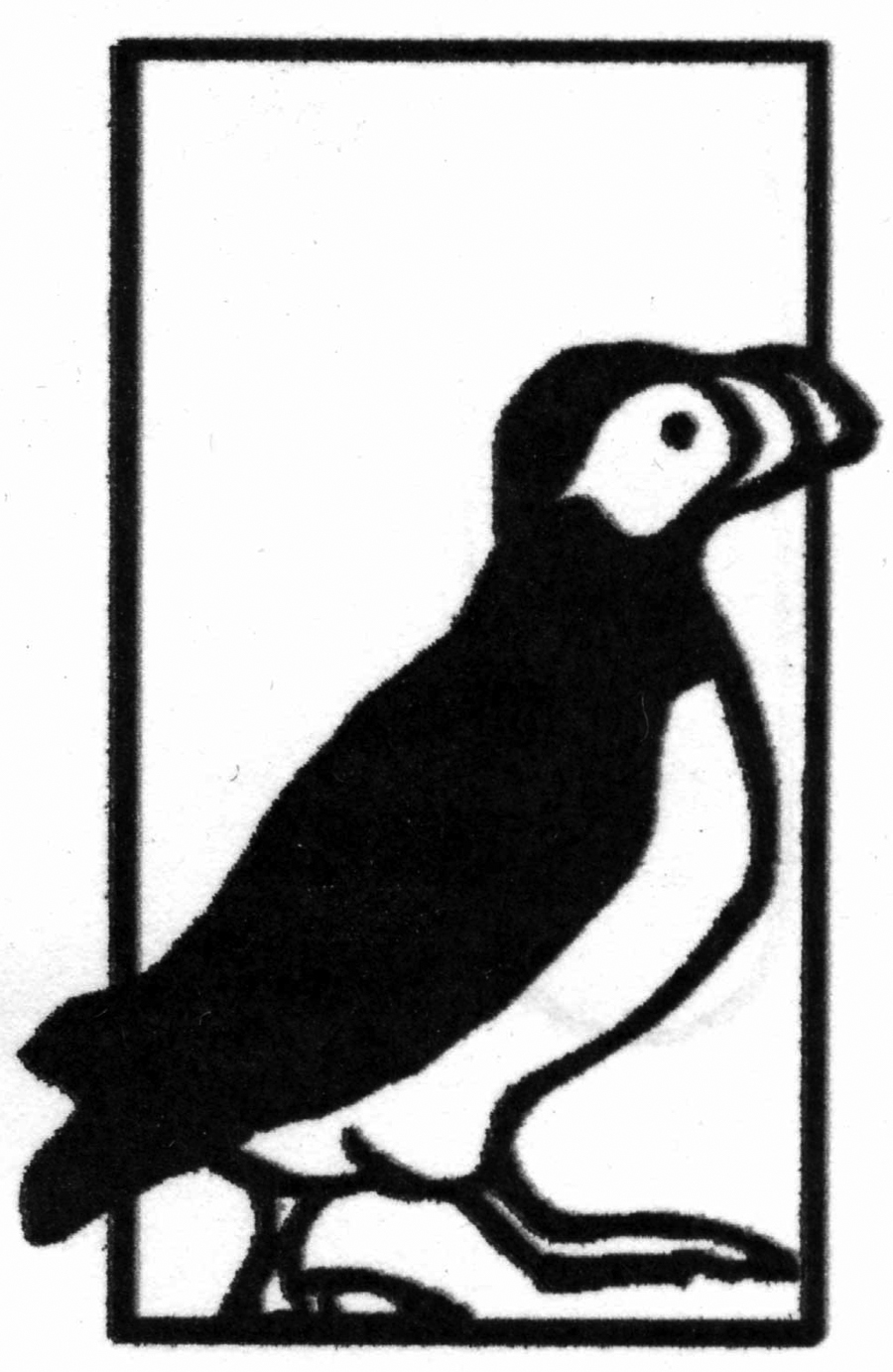 |
|||
| Funding also provided by the Puffin Foundation, "...continuing the dialogue between art and lives of ordinary people." | |||
| Home | ||||||||||||
| Calendar | ||||||||||||
| History | ||||||||||||
| Opportunities | ||||||||||||
| Vox Novus | ||||||||||||
| Site Map | ||||||||||||
| Contact | ||||||||||||
| Hosted by Malted/Media and Kalvos & Damian's New Music Bazaar | ||||||||||||
![[ Vox Novus - the new voice for contemporary music ]](http://www.voxnovus.com/img/Vox_Novus_Logo_black.png) | ||||||||||||
![[ Composer's Voice ]](http://www.voxnovus.com/img/Composers_Voice_Collaboration_Logo.png) | ||||||||||||